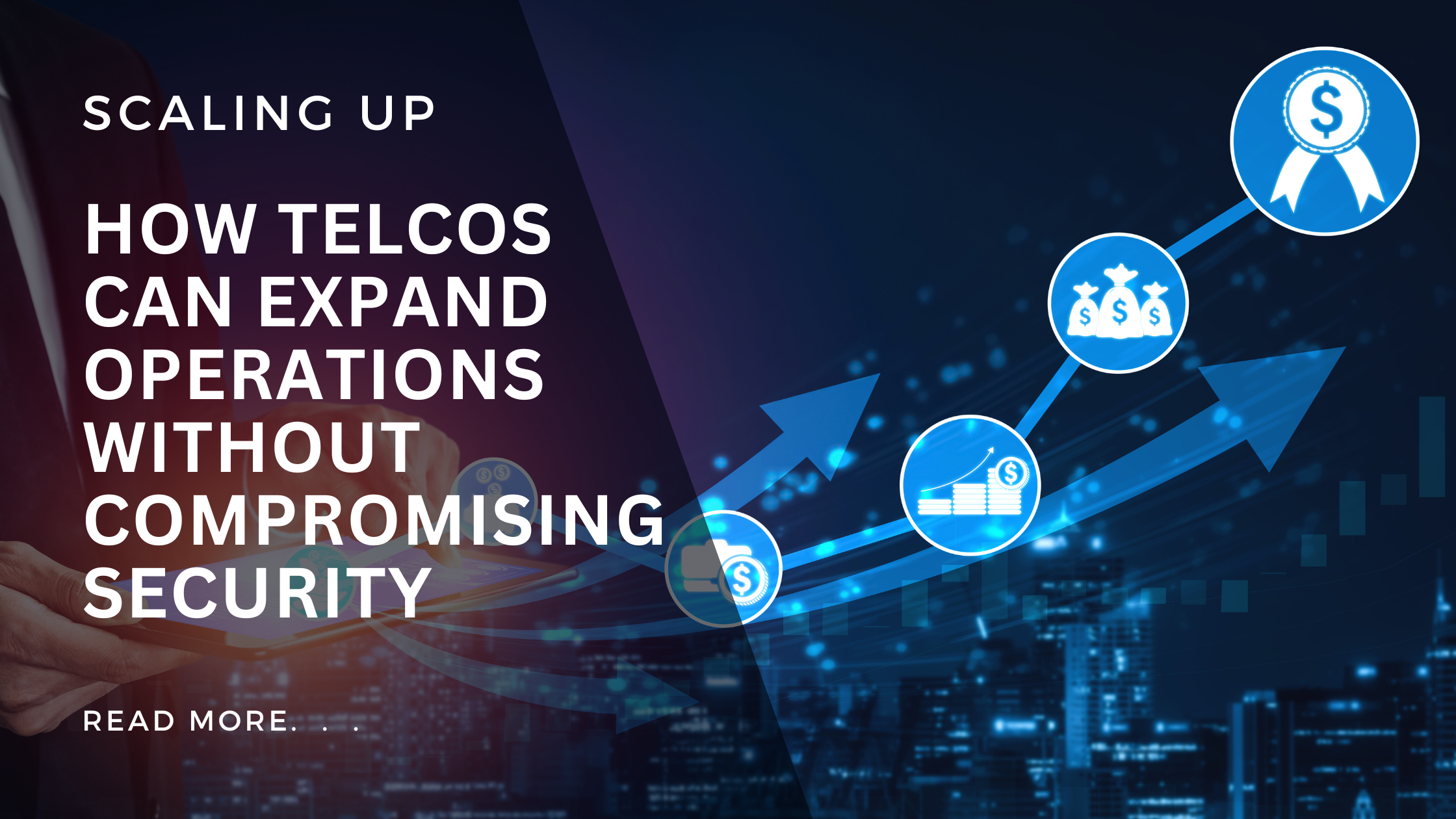The rapidly evolving digital landscape is continuously pushing telecom companies to scale up operations. Whether expanding into new markets, rolling out innovative services in an increasingly connected world, or simply accommodating a growing customer base, growth is essential. However, this need for scalability can come at the expense of security. Cybersecurity threats are multiplying in number and sophistication, posing a massive risk to telcos, their customers, and the critical infrastructure they support.
Striking the balance between growth and security requires a holistic strategy. This blog post examines the challenges of scaling securely and provides a roadmap for telcos to implement a multi-layered, proactive approach to security.
The Growing Cyber Threat Landscape: Understanding the Risks
As telecoms expand, their risk landscape broadens, heightening security concerns. With larger attack surfaces, increased data volumes, evolving threats, and network complexity, the stakes for robust security measures become even higher during periods of growth. Before delving into solutions, let’s understand the common cybersecurity threats faced by expanding telcos:
- Network Intrusions: Compromised network infrastructure, from routing systems to cellular towers, can disrupt service and expose sensitive data.
- Data Breaches: Telecoms store vast customer information – names, addresses, usage patterns – making them a prime target for data breaches.
- Ransomware Attacks: Increasingly sophisticated ransomware attacks encrypt a telecom’s systems, demanding large ransoms for restoring services.
- Social Engineering: Manipulation of employees through phishing or social engineering tactics can lead to unauthorised access and security breaches.
- Internet of Things (IoT) Vulnerabilities: The growing network of telecom-connected smart devices adds new entry points for potential cyberattacks.
Consequences of Security Breaches in Telecoms
In the heavily regulated telecoms industry, the ramifications of a security breach extend far beyond immediate financial losses:
- Revenue Impact: Outages, service degradation, and fraud associated with breaches all directly impact revenue streams.
- Regulatory Fines: Strict data privacy regulations like GDPR, POPIA, and CCPA mean non-compliance results in significant fines.
- Reputational Damage: News of a security breach erodes consumer trust, hampers customer acquisition efforts, and can damage long-term brand reputation.
- Disruption to Critical Services: Successful attacks on telecom infrastructure can have far-reaching consequences, potentially disrupting essential communication services for society as a whole.
Strategies for Security-Centric Scaling
The good news is that with a proactive approach, growth and security can go hand-in-hand. Here’s a breakdown of crucial strategies for telcos:
- Invest in a Zero-Trust Framework: Zero-Trust moves away from perimeter-based security. It assumes no user or device is inherently trustworthy. Rigorous authentication is required at every network access point. This is vital in a scaled environment where traditional “castle-and-moat” security models fall short.
- Secure the Supply Chain: Telecom providers rely on third-party vendors for software and hardware. Rigorous vendor assessments and security requirements must be in place to mitigate risks throughout the supply chain. Consider implementing a vendor risk management framework to ensure third-party partners meet the same security standards as your organisation.
- Leverage AI and Machine Learning: The massive volume of data generated by telecom networks makes human-only monitoring impossible. AI/ML-powered tools can analyse vast data sets in real-time to proactively detect anomalies, potential fraud patterns, and threats. They can also automate security tasks, freeing up security personnel to focus on higher-level analysis and mitigation strategies.
- Prioritise Cloud Security: Cloud-based BSS and operations platforms offer scalability, but robust security is paramount. Choose cloud providers with a proven security track record and strong encryption standards. Ensure proper cloud security configurations and implement multi-factor authentication protocols even for cloud-based systems.We’d like to highlight that at TAUSPACE, we provide both cloud-based and on-site solutions, tailored to meet the specific preferences of our clients.
- Build a Culture of Security Awareness: Even the best technology cannot safeguard an organisation if employees are not vigilant. Regular security awareness training, phishing simulations, and a strong focus on social engineering risks are essential. Create a culture where all employees are frontline defenders, empowered to identify and report suspicious activity.
- Embrace IoT Security Best Practices: The expanding network of IoT devices poses new challenges. Segment IoT devices on the network, implement strong encryption, and regularly patch and update firmware across all connected devices.
- Develop a Proactive Incident Response Plan: Despite best efforts, breaches may occur. A well-defined incident response plan is essential to minimise damage and restore services swiftly. This plan should include clear roles, communication channels, and regular testing to ensure efficiency in a real-world crisis.
Additional Considerations for Scaling and Security
- Continuous Monitoring: Implement real-time network and security monitoring to detect potential threats and vulnerabilities early on.
- Data Encryption: Encrypt sensitive data both at rest and in transit for optimal protection.
- Disaster Recovery: Have a robust disaster recovery plan that addresses various scenarios, including cybersecurity incidents, ensuring quick service restoration.
- Regulatory Compliance: Staying up-to-date with local and international cybersecurity regulations such as GDPR is crucial, as well as demonstrating a commitment to security and building customer trust.
- Collaboration: Share threat intelligence and best practices within the telecom industry through partnerships and industry associations.
- Investment Mindset: View cybersecurity not as a cost but as an investment in protecting revenue streams, reputation, and the ability to scale responsibly.
Conclusion
Scaling operations in the telecom industry demands a forward-thinking approach focused on both growth and security. Cyber threats are ever-evolving, requiring telecoms to adapt and strengthen their security posture continually. By prioritising zero-trust frameworks, investing in AI/ML capabilities, building a secure supply chain, leveraging the cloud effectively, prioritising employee training, and embracing a proactive approach to incident response, telecom companies can navigate the scaling process with confidence, ensuring security is an enabler of growth, not a blocker.









